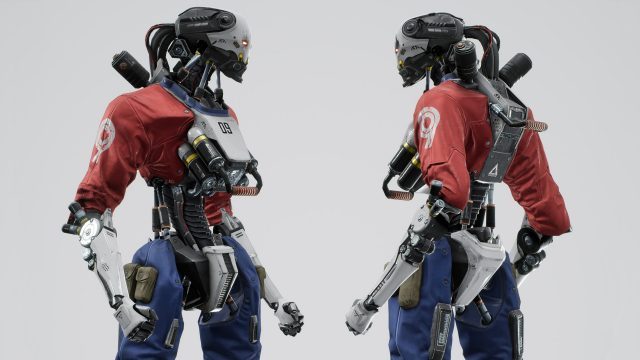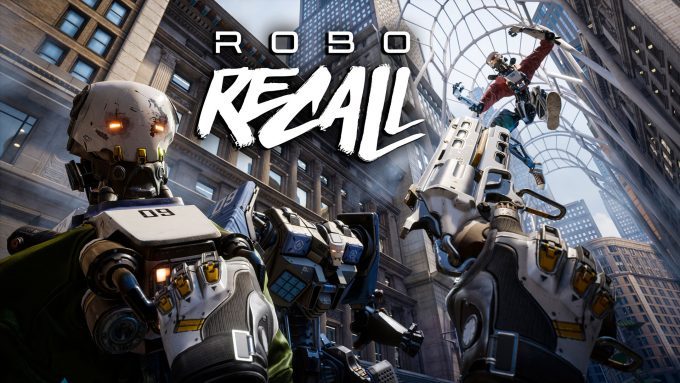Good news. Robo Recall, one of the best looking games available on a VR headset today, actually cost a lot less to produce than the rumored $10 million.
It’s certainly a compliment to the small team at Epic Games responsible for the game that the notion of a $10 million production budget was so widely spread and accepted. Robo Recall is great, but, it turns out, not $10-million-great.
The Origin
The suggestion of a $10 million budget started with an interview with Epic Games CEO Tim Sweeney at last year’s VRX conference where he addressed the fact that Oculus had offered to fund production of game so that it could be published for free on their platform, saying that “Oculus is funding Robo Recall which has a budget that’s close to the budget of the entire first Gears of War (2006) game.”
That statement, taken with another in a 2007 Wired interview with Epic Games Vice President Mark Rein, who said that the original Gears of War had a budget of “somewhere between nine and ten million dollars.” This was very reasonably presumed to indicate that Robo Recall’s budget fell near the $10 million mark. A nugget of info that’s been spread far and wide in the VR space.
Lost in Translation
But it seems that something was lost in translation. Epic’s Technical Director of VR & AR, Nick Whiting, who worked closely on Robo Recall, hints that the game’s budget was actually much more conservative. .
“I’d have to check with Tim on that,” Whiting said in a recent interview with Road to VR when asked about Sweeney’s remarks. “He may have been referring to something other than the $10 million Gears budget that some people inferred from another interview.”
Colloquial use of the terms “budget” and “funding” is a likely root of the misunderstanding; what Oculus paid Epic to create Robo Recall is likely very different than how much the game cost to produce. After all, the game is completely free, but Epic almost certainly would want some upside on what the game would have earned if it had been launched with a price attached.
Whiting understandably didn’t want to get into specific figures, but laid out the scope of the team that created the game.
“There were around 15 full-time employees for about a year [working on Robo Recall], with the team starting to be assembled right after GDC 2016 and building over a few weeks to full size,” he told Road to VR. “In addition, we had six contractors for gameplay programming and QA, as well as some art and audio help through outsourcing. We also had a few people we borrowed for other teams at Epic for a few tasks like rigging and narrative for short bursts.”


Ready Your Envelopes
With that information, we can rough out the true scope of the game’s production with a little back-of-the-envelope math. I reached out to some industry vets to check the following estimates against their experiences in game development.
Game Industry Career Guide cites sources putting game developer salaries somewhere between $70,000 and $130,000 annually, depending upon experience. To give our estimate plenty of buffer, let’s assume Epic, as a leading games company, is attracting and keeping top talent; so let’s take the top salary figure of $130,000 and bump it up to $150,000 as our guess for the salary of those who worked full-time on Robo Recall.
For 15 full-time staff for a year starts our estimate at $2.25 million. Whiting also says there were six contractors for programming and QA. The goal of hiring contractors of course is to save money over full-time staff, so let’s estimate the equivalent of a lesser (but still cushy) $125,000 salary for each contractor, and assume they were there for the full year as well. That adds an additional $750,000 to our budget, putting things comfortably at $3 million.
Then there’s the outsourced art and audio help, and a few people who were borrowed internally for short bursts of work. These two pieces were likely the least costly from a staff standpoint, but to keep our estimate safe, let’s assume it cost just as much as the six contractors, and slap another $750,000 on our estimate. That brings us to $3.75 million.
Another cost worth considering is equipment needed during development. Let’s again offer plenty of padding and assume that each of the 15-person team needed a brand new high-end VR-capable computer for $2,000 a pop and an Oculus Rift + Touch for $800 each ($42,000), and round that up to an even $50,000 for good measure. Now we’re at $3.8 million.
You might guess that marketing would be a major cost as well, and though we’ve seen a little marketing action for Robo Recall, it’s not been a major push by most measures. That and, if we look back at the original interview with Mark Rein which established the $10 million upper budget limit for Gears of War, the context of the discussion was Rein saying how inexpensive it was to “make Gears of War,” because of the company’s Unreal Engine tech. His point would have been not been as salient if he wrapped marketing dollars into that figure, and thus my gut is to also not include a marketing budget in the Robo Recall estimate. If you really want to count it, slap another $1 million onto our $3.8 million estimate and we’re still comfortably under $5 million.
Surely there’s a number of other smaller costs not accounted for in this estimate (I’m willing to bet at least one pizza was ordered during the development of Robo Recall), but we’ve got the major pieces, and by keeping our back-of-the-envelope reasoning at the high end of every estimate, we will have hopefully well covered smaller unmentioned costs.
– – — – –
So, somewhere around $3.8 million to develop Robo Recall. That’s great news, because it shows the sort of high production value that can be achieved in VR with a small team on a modest budget that’s significantly less than $10 million, and—extrapolating from what we see in Robo Recall—it gives us an idea of what a AAA VR game could look like in the future with a real $10 million production budget. So here’s to hoping that the next VR project from Epic Games does end up with that budget.

